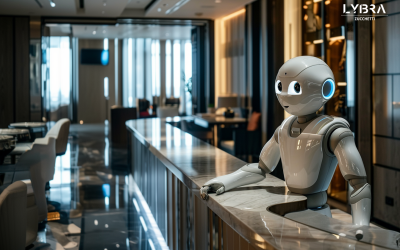In the intricate and highly competitive world of the hospitality industry, finding a way to stand out amongst a sea of competitors can be a daunting task. Despite this challenge, the rewards that stem from implementing a successful brand strategy are invaluable. Today, we explore the transformational process of turning your hotel from merely a place for travelers to rest their heads, to a much-anticipated destination.
The Power of Branding
Successful businesses are underpinned by strong brands. For hotels, branding stretches far beyond the typical concepts of a name, logo, or tagline. It encompasses the narrative you weave, the culture you cultivate, and the unique experiences you curate.
Imagine a boutique hotel situated in the heart of a bustling metropolis. Unlike the sea of generic city hotels around it, this one distinguishes itself with an innovative concept: every inch of its interior design is inspired by local artists. From the moment guests walk into the lobby, they feel as though they’ve stepped inside a lively, dynamic art gallery. This unique selling point differentiates the hotel and establishes a memorable brand.
Identifying Your Unique Value Proposition
The first step in creating a potent brand is identifying what sets your hotel apart from the rest. It could be your location — perhaps you’re perched on a cliff with breath-taking ocean views. Or maybe it’s the history — your hotel might be a refurbished 17th-century manor, offering guests a chance to step back in time. Alternatively, it could be an overarching ethos, such as a firm commitment to environmental sustainability and being entirely carbon neutral.
Each of these unique selling propositions (USPs) contributes to your brand, carving out a niche in the marketplace that’s distinctly yours.
Creating a Memorable Guest Experience
In today’s world, travellers are increasingly seeking more than just a comfortable place to sleep. They yearn for experiences that stand out, stories that they can share and memories that last a lifetime.
Consider a hotel nestled in a lush valley, surrounded by vineyards. The hotel could partner with local winemakers to offer exclusive wine-tasting tours for their guests, complete with a picnic amidst the vineyards. Or think of a resort situated by the beach that organizes private moonlit dinners by the shore, complete with a private chef and violinist. These unique, experiential offerings can serve to elevate a guest’s stay from mere accommodation to a destination they’ll remember fondly.
Building a Strong Local Connection
Having a strong local connection can further enhance your brand. Collaborate with local businesses and artisans to offer guests a slice of the local culture.
For example, a hotel located in a town known for its vibrant street food culture could organize weekly night-market tours. Guests could have the chance to taste local delicacies guided by a local food expert. This not only provides guests with an authentic experience but also helps the local community, reinforcing your hotel’s brand as a socially responsible business.
Leveraging Social Media and Online Marketing
In the era of digitization, your online presence can make or break your brand. Social media platforms like Instagram and Facebook are powerful avenues to showcase the unique experiences your hotel offers.
For instance, a hotel in a tropical paradise might run a campaign encouraging guests to share photos of the stunning sunset views from their balcony using a unique hashtag. These shared moments serve as a peer-endorsed advertisement for your hotel, drawing in future guests with the promise of similar experiences.
Consistent Brand Messaging
Consistency is the backbone of a strong brand. Every communication channel – your website, brochures, social media, in-person interactions, the decor of your hotel – should echo the same brand values and narrative.
If your brand promotes tranquility and relaxation, every element of your hotel should contribute to that narrative. The color palette could incorporate cool, calming hues. The language used on your website and in communication with guests should be serene and peaceful. Your staff could be trained to interact in a manner that adds to the relaxing ambiance.
Regularly Review and Adapt Your Strategies
The only constant in the hospitality industry is change. Thus, regular review and adaptation of your branding strategies are pivotal.
For instance, a hotel might find that their guests love the live music sessions in the lobby bar every evening. Capitalizing on this, the hotel can revise their branding strategy to include these live sessions as a key part of their guest experience. They might even feature clips from these sessions on their website or social media, further enticing potential guests.
Harnessing the Power of Revenue Management Systems
While building a compelling brand and curating unique experiences are key aspects of transforming your hotel into a destination, it’s crucial to understand that these strategies need to be supported by robust pricing strategies to truly deliver results.
In the dynamic hospitality industry, the right price can make all the difference. This is where a Revenue Management System (RMS) comes into play. An RMS allows hoteliers to adopt data-driven pricing strategies, optimizing rates based on supply and demand, seasonality, competitor pricing, and other crucial market variables.
But an RMS isn’t just about determining room rates. It can provide you with powerful insights that can inform your branding strategy. It helps identify peak periods of demand that could be linked to specific experiences your hotel offers, helping you refine your unique selling proposition and tailor your guest experience.
And this is where Lybra Assistant RMS can assist. Lybra’s cutting-edge RMS uses advanced machine learning algorithms to analyze vast amounts of data, enabling you to design and implement effective pricing strategies. It aids in maximizing revenue while ensuring your prices align with the brand image you want to portray. In conjunction with the strategies outlined in this article, Lybra Assistant RMS can be the final piece of the puzzle in your quest to transform your hotel into a destination.
Conclusion
Transforming your hotel into a destination is a strategic move to carve out a unique space for your business in the hospitality industry. By identifying your unique selling proposition, curating memorable experiences, building strong local connections, leveraging social media, and maintaining consistent branding, you can offer more than just accommodation.
Your hotel becomes a memory, an experience, a story that remains etched in the minds of your guests long after their stay. And with this innovative approach, your hotel can truly become a destination in itself – a place that stands out amongst the rest, a place that travellers eagerly add to their bucket list.
Branding is not a one-time task, but a continuous process of discovery, innovation, and adaptation. As you focus on these strategies, your brand recognition will grow. You’ll foster customer loyalty, secure increased revenue, and cement your place as a sought-after destination in the ever-evolving landscape of the hospitality industry.
Contact us now for a free demo of Lybra Assistant RMS, the revenue management system that is key to transforming your hotel into a destination!










